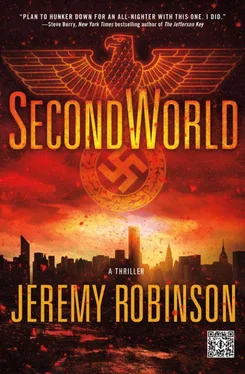“Afternoon, sir,” the man in blue said.
Miller ignored him, but glanced at the three men. They weren’t looking at his face. They were looking at his weapons—a sound-suppressed Sig Sauer and an UMP submachine gun. Both were modern weapons used by American Special Forces. Miller remembered that all of the Germans he had fought thus far carried vintage World War II weapons. It must be a source of pride. A badge of honor that set them apart from their modern counterparts. Miller looked at the brownshirts’ weapons. Mauser C96s. Old-school German handguns. The man in blue carried a newer Heckler & Koch HK4 pistol.
“You see something purty out there?” the man in the blue shirt said.
When Miller passed the man without acknowledging his existence, he lost his patience. “Hey, I’m talking to you.”
“Wer sind Sie?” one of the German brownshirts said, then more angrily, “Wie ist Ihr Name?”
Miller spun, drew his silenced handgun, and fired four times, hitting both brownshirts in the chest. Both men spilled back into the room without making a sound. Vesely took out the blueshirt just as quickly, but caught him as he fell forward into the walkway. Vesely quickly pulled the man’s body into the room while Miller and Pale Horse moved the brownshirts farther inside.
The room looked like a small studio apartment. The walls were a warm brown, not white like everything else, and were lit by a series of sconces. Framed posters of outdoor scenes hung from the walls. A bed sat in the corner, across from a small kitchenette with an eat-in bar. There was a couch. A wall-mounted flat-screen TV. Even a fish tank.
The only door in the place opened up. A woman dressed in a white silk nightgown stepped out of a small bathroom. “Okay, boys, I—” She looked up and saw them, then fell over dead with a hole in her forehead.
Miller lowered the weapon. “Let’s move.”
They closed the door behind them, made sure it locked, and continued down the ramp. A man in blue exited from room forty, gave them a nod, and turned to the left, heading in the same direction. As he rounded the bend, a robo-Betty paused as he walked past. The blinking red light turned green. Then it headed for Miller.
Vesely got in front of Miller as they reached room thirty-seven. The robo-Betty approached quickly.
“Keep watch,” Miller said.
“Won’t that be kind of conspicuous?” Pale Horse said.
Miller motioned to all the people standing around on the ramps, just having conversations. “You’re two white men, dressed as guards, having a conversation. No one will notice you. And you’ve already passed—” He pointed at the Betty, just ten feet away. “—that thing’s DNA purity test.”
Miller tried the door handle and found it unlocked. He opened the door, slid inside, and closed it behind him just as the Betty arrived and began scanning Vesely. The room was nearly identical to the one now holding four dead bodies, with one exception—a blond woman with a bob haircut, petite body, and curvy hips lay on the bed, facing the far wall. Was she asleep?
Miller approached slowly, weapon at the ready. He rounded the bed, gave the open bathroom a glance to make sure they were alone, and then looked at the woman’s face.
Adler! They had dyed her hair blond again.
He lowered the weapon, walked to the side of the bed, and put his hand on her shoulder. He opened his mouth to say her name, but never got the chance.
Her hand reached up, snatched his wrist, and pulled him down. A flash of metal caught Miller’s eye as she brought her free hand up and thrust a knife toward his eye.
Miller felt the serrated blade tug at the skin next to his eye and slice through a few layers, but his reflexes saved him as he ducked to the side. The attack didn’t stop there, though. Adler spun on her back and kicked him hard in the gut. Miller fell back, the wind knocked out of him, and struggled for air.
“Adler,” he said, but his voice was raspy and unrecognizable.
The woman lunged, knife raised.
Miller had no choice but to defend himself. He caught Adler’s arm and gave it a twist. She shouted in pain, dropping the knife, but began pummeling at him with her free hand.
He kicked out her legs, sprawling her onto the floor. She fell on top of one of his legs, so he wrapped the other around her, locked them together, and squeezed. While she punched his legs, he managed to push himself up and say, “Can you please stop trying to kill me for a second.”
Adler’s head whipped toward him, eyes wide with shock.
He let her go and she dove on him again, this time crushing him with a hug. She held on to him for several seconds, squeezing him hard, until he asked, “Have they hurt you?”
She let go of him and sat back. “Aside from plotting genocide, they’ve been perfect gentlemen.” She looked him in the eyes. “I thought you were dead.”
He stood, straightened his uniform, and picked up his cap. “Came close.”
“Vesely?”
“He’s on the other side of the door, keeping watch.”
She looked relieved. “How did you get in?”
“Not important right now.” He took her by the shoulders. “What is important is that you tell me absolutely everything you know about this facility, its security, how to get into the Security and Control center and shut down the Bells.”
“How much longer do we have?” she asked.
She doesn’t know, he thought.
She noticed the urgency in his eyes. “What?”
“It’s already started.”
She sat down on the bed. “Oh my God.”
“We have hours,” he said. “Maybe less.”
She said nothing.
“Elizabeth, I need you to tell me everything you know.” He crouched down in front of her. “Right now.”
She looked at him, as though dazed, and then snapped out of it. Her eyes widened. “I think I know how to stop it.”
“Stop what?”
“Everything,” she said. “The attacks. The Bells.” She turned toward the end table.
Miller looked and there on the table sat the brown leather journal of the first Elizabeth Adler.
The first thing Miller felt upon seeing the journal was suspicion. He stood up and took a step back, looking at Adler with fresh eyes. She was dressed in white—the color designated for the general population, but instead of the plain coveralls that he’d seen other people wearing, she wore a flowing white skirt with white lace trim at the bottom. Her shirt, which hugged her lithe torso, had long sleeves that ended in flowery lace cuffs that covered her hands. Her skin looked soft and radiant, like she’d been to a spa, and her hair—not only had the black dye been removed, but Adler’s crude haircut had been cleaned up. Compared to the other people in the Arche 001, she looked like a princess.
With the sting of Brodeur’s betrayal still fresh, Miller gripped his weapon a little tighter and asked, “How did the journal get here?” He couldn’t remember the last place he’d actually seen it. New Hampshire? She kept it in her oversized purse, and he certainly hadn’t seen that, since when? Poland. She had it in Poland.
She noted his rigid body language and the skepticism in his voice. She looked hurt by it, but answered, “I kept it with me. When we flew from the George Bush to the George Washington. And then to the Antarctic base. Tucked into my waist.”
“Why didn’t you tell me?” he asked.
“I didn’t think it mattered. I didn’t keep it because I thought it would help, I kept it because I was hoping to find something in it that would vindicate my family. That my bloodline is responsible for global genocide sickens me.”
Miller thought about it. Based on what he knew about Adler, it made sense. But still, he’d been convinced about Brodeur, too. And her clothes… the way she’d just been lying in bed while the world outside choked to death. It didn’t sit well with him.
Читать дальше












